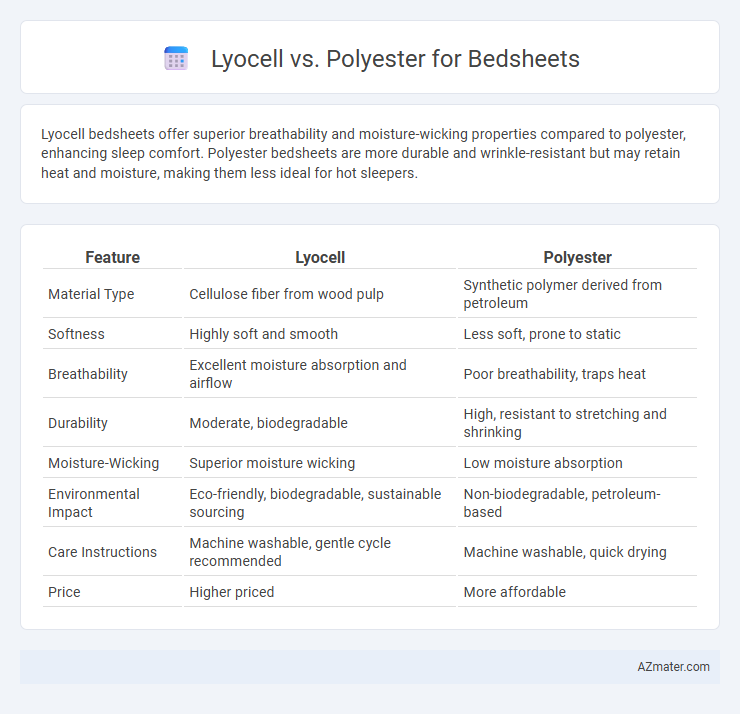Lyocell bedsheets offer superior breathability and moisture-wicking properties compared to polyester, enhancing sleep comfort. Polyester bedsheets are more durable and wrinkle-resistant but may retain heat and moisture, making them less ideal for hot sleepers.
Table of Comparison
| Feature | Lyocell | Polyester |
|---|---|---|
| Material Type | Cellulose fiber from wood pulp | Synthetic polymer derived from petroleum |
| Softness | Highly soft and smooth | Less soft, prone to static |
| Breathability | Excellent moisture absorption and airflow | Poor breathability, traps heat |
| Durability | Moderate, biodegradable | High, resistant to stretching and shrinking |
| Moisture-Wicking | Superior moisture wicking | Low moisture absorption |
| Environmental Impact | Eco-friendly, biodegradable, sustainable sourcing | Non-biodegradable, petroleum-based |
| Care Instructions | Machine washable, gentle cycle recommended | Machine washable, quick drying |
| Price | Higher priced | More affordable |
Introduction to Lyocell and Polyester Bedsheets
Lyocell bedsheets are made from sustainable wood pulp fibers, offering exceptional breathability, moisture-wicking properties, and a soft, silky texture ideal for sensitive skin. Polyester bedsheets, composed of synthetic polymers, provide durability, wrinkle resistance, and affordability but may lack the moisture absorption and environmental benefits of natural fibers. Choosing between Lyocell and polyester involves balancing comfort, eco-friendliness, and budget preferences for optimal sleep quality.
Material Composition: Lyocell vs Polyester
Lyocell is a natural fiber made from sustainably sourced wood pulp, primarily eucalyptus, processed using a closed-loop system that minimizes environmental impact. Polyester, a synthetic fiber derived from petrochemicals, is produced through polymerization, resulting in a durable but less breathable fabric. The plant-based composition of Lyocell offers superior moisture absorption and softness compared to the plastic-based structure of polyester, which often traps heat and moisture.
Softness and Comfort Comparison
Lyocell bedsheets offer superior softness and breathability compared to polyester, making them ideal for individuals with sensitive skin or those seeking natural comfort. Polyester sheets tend to be less breathable and may retain heat, potentially causing discomfort during warm nights. The moisture-wicking properties of Lyocell enhance comfort by keeping sleepers cool and dry, unlike polyester which can trap sweat and reduce overall softness.
Breathability and Temperature Regulation
Lyocell bedsheets excel in breathability due to their natural cellulose fibers, promoting moisture-wicking and better air circulation, which helps regulate body temperature and keep sleepers cool. Polyester, a synthetic fabric, tends to trap heat and moisture, often resulting in less effective temperature regulation and reduced breathability. Choosing Lyocell over polyester enhances comfort by maintaining a cooler, drier sleep environment.
Moisture-Wicking Abilities
Lyocell bedsheets exhibit superior moisture-wicking properties compared to polyester, effectively drawing sweat away from the skin and promoting a cooler sleep environment. The natural cellulose fibers in Lyocell allow for enhanced breathability and moisture absorption, reducing humidity and discomfort during the night. In contrast, polyester's synthetic fibers tend to trap heat and moisture, making it less effective for moisture management in bedding applications.
Durability and Longevity
Lyocell bedsheets exhibit superior durability due to their strong cellulose fibers, which resist pilling and tearing over time, making them ideal for long-term use. Polyester sheets, while less breathable, often offer enhanced wrinkle resistance and maintain color vibrancy after multiple washes, contributing to their longevity. Choosing between Lyocell and Polyester depends on prioritizing natural fiber durability or synthetic resilience for extended bedsheet lifespan.
Eco-Friendliness and Sustainability
Lyocell bedsheets outperform polyester in eco-friendliness due to their biodegradable and renewable fiber source made from sustainably harvested wood pulp. Polyester, derived from non-renewable petroleum, contributes significantly to microplastic pollution and has a higher carbon footprint during production. Choosing lyocell supports reduced environmental impact, promoting sustainability through lower water usage and a closed-loop processing system that minimizes waste.
Maintenance and Care Requirements
Lyocell bedsheets require gentle machine washing in cold water with mild detergent, avoiding bleach and high heat drying to maintain fabric integrity and softness. Polyester bedsheets offer easier maintenance, as they can be machine washed in warm water, dried on low heat, and resist wrinkles and shrinking. Lyocell is biodegradable and may need more delicate care, while polyester's synthetic nature provides durability and low-maintenance convenience.
Price Comparison: Lyocell vs Polyester
Lyocell bedsheets generally cost between $40 to $100 per set, reflecting their eco-friendly production and superior breathability. Polyester bedsheets are much more affordable, typically priced from $10 to $30 per set, making them a budget-friendly option. The price difference is significant due to Lyocell's sustainable sourcing and moisture-wicking properties versus polyester's synthetic material and mass production.
Which is Better for Bedsheets: Lyocell or Polyester?
Lyocell bedsheets offer superior breathability, moisture-wicking properties, and eco-friendly benefits compared to polyester, making them ideal for sensitive skin and warm climates. Polyester bedsheets are more durable, wrinkle-resistant, and budget-friendly but tend to trap heat and moisture, which can lead to discomfort during sleep. Choosing Lyocell provides a softer, cooler sleeping experience with sustainable benefits, while polyester suits those seeking affordability and low maintenance.

Infographic: Lyocell vs Polyester for Bedsheet
 azmater.com
azmater.com